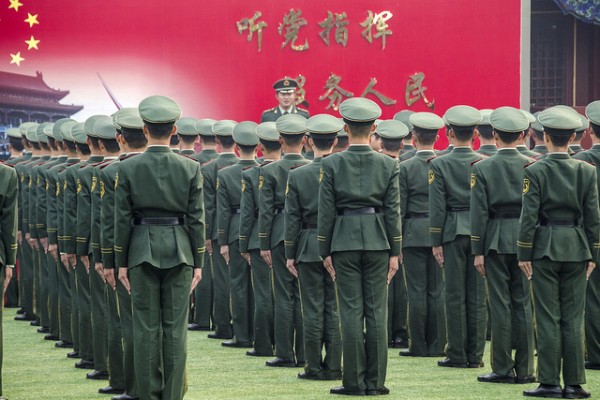
Photo Credit: caledomac via Flickr
Beijing’s announcement on Thursday of a 10 percent increase in military spending, to $145 billion, marks the fifth consecutive year of double-digit increases, and is not without significant repercussions in Asia. Japan recently increased its defense budget to a record $42 billion, the third consecutive year of increases following 11 years of decline. In India, spending on defense will increase 11 percent to $40 billion, with the biggest increases targeted at the navy and air force.
Perhaps in an effort to counter growing concern over increased Chinese military spending and territorial influence in the Indian Ocean, Prime Minister Narendra Modi made his own announcement this week to extend military and civilian assistance to the island nations of Maldives, Mauritius, the Seychelles and Sri Lanka, which he will visit starting next week. While Beijing has been actively courting the island nations, New Delhi has long neglected these countries. (Sri Lanka was last visited by an Indian prime minister 28 years ago.)
Indeed, India’s past neglect of Sri Lanka paved the way for China to build ties with Sri Lanka’s previous president, Mahinda Rajapaksa, who welcomed Chinese investment with open arms. The Indian government was notably angered after Rajapaksa allowed Chinese submarines to dock on two occasions in the capital, Colombo, without notifying New Delhi.
With the new government under President Maithripala Sirisena, Sri Lanka is now pushing back on Beijing’s advances, refusing naval visits and reviewing infrastructure contracts signed with Chinese corporations. New Delhi has taken notice, and is helping push forward military training while also providing support for a 500 megawatt power plant to be built by India’s state-run National Thermal Power Corporation in Trincomalee, a strategically-located port in eastern Sri Lanka.
In other island nations, New Delhi seeks to regain its role as the traditional provider of security in the Indian Ocean and counteract Beijing’s growing influence. China has been busy building key infrastructure such as power stations, highways and seaports for the small island nations. New Delhi plans to counter this influence by supplying patrol vessels, surveillance radars and ocean mapping services, following an extensive survey on maritime needs carried out by its defense ministry.
As a result of the survey, Mauritius is expecting a 1,300-ton Indian-built patrol ship and training for its coast guard, and the Maldives will receive help with surveillance radars to protect against piracy and the threat of Islamic State. The Seychelles expect to sign an agreement with New Delhi for assistance in mapping its waters, and Sri Lanka will look forward to assistance with its fisheries patrols.
Of course, with their smallish economies, the island nations cannot afford to choose between India and China, and will likely use the heated rivalry over influence to reap rewards from both nations. The island nations will remain reluctant to offend Beijing, whose offer to participate in China’s Maritime Silk Road will bring much-needed infrastructure and economic growth.
In addition to expected infrastructure investment, Beijing’s 10 percent increase in military spending will certainly help fuel increases in military spending across Asia, with the smaller nations the main beneficiaries of any increases in government paranoia. Both Beijing and New Delhi should not expect the smaller states to choose between them, especially if smaller-scale, not too offensive military assistance or economic infrastructure is on offer, and not the more offensive building of strategic and sensitive military installations. We can expect more small-scale military cooperation and infrastructure investment for the island nations in the coming years as the India-China rivalry for control of the Indian Ocean heats up.